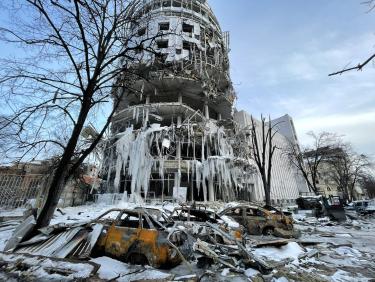Did you ever believe it could happen?
Even those politically indifferent have been at least mentally involved in the apocalyptic situation of the past weeks in the heart of Europe. Is the devastating Russian invasion of Ukraine the dawn of WWIII?
For millions, the 24th February 2022 split their lives into before and after. Although talks about the Russian invasion had been around for a while, raising insecurity and anxiety levels both globally and locally, the situation seemed to be rather static. The war of words between the confronting parties and global powers had been practiced extensively, while the battlefield, Ukraine, being already crippled, had just been closely observing, gathering its own forces and hoping for effective preventive measures. Which were in vain, as the latter were limited to deep concerns and a potentially high price to pay in any case.
The point is that the process started much earlier than last autumn. Cutting off some parts of the Ukrainian state body in 2014-15 was accompanied with appeasement policy, which entailed understanding of its impunity by the aggressor. The first wave of Apocalyptic events and thoughts shocked Ukrainians, though mainly in the affected regions. Furthermore, gradually, due to the natural human adaptability, common Ukrainians began putting up with the new reality as to survive, since it was both mentally and physically impossible to keep living under severe pressure for years. As such, it did not mean that Ukrainians forgot about the bleeding wound and ignored it, but they refused to let it be the key inhibitor in their lives, which could also be in the interests of the aggressor. The situation of simmering uncertainty lasted until spring 2021, when the Russian Federation built up its troops around the Ukrainian border as a new threat of invasion. That wave of escalation did not result in open aggression and eventually subsided. Later that year, voices in the West began informing the public about another wave of escalation and a threat of a full-scale war.
The end of 2021 to early 2022 was a turning point in history, reflecting the pre-apocalyptic stage. This period featured mixed internal, as well as common, feelings of fear, anxiety, anger, hatred, and horror. The precarity grew throughout the country, making the community nervous and businesses highly cautious about their future security. Driving along Kharkiv evening streets on 23rd February, I happened to recall a Soviet story entitled “Tomorrow Was the War”, as there were no visible signs of being on the verge of war. Nonetheless, the next morning peaceful citizens woke to the sounds of shelling and the sight of fires here and there on the horizon.

“Those experiencing apocalyptic events discover the emergence of parallel worlds both internally and externally.”
According to Maslow’s hierarchy, the apocalypse in action means that a person swiftly switches over to face new purely deficient needs. These needs cause immense suffering, prompt the sufferer to hide, flee, or fight for freedom, rights, and life in general The injustice of war sets basic existential questions of personal and common responsibility, as well as the freedom of choice. It is this situation that has clearly unveiled real attitudes and shown genuine friends and foes. At the interpersonal level, numerous families terminated any communication whatsoever due to the existential misunderstanding or unwillingness to listen and hear each other. Those experiencing apocalyptic events discover the emergence of parallel worlds both internally and externally.

“History is a fate and all that is left is for fate to be executed.”
In particular, staying in shelters and outside them makes a difference. People’s activities and preferences, their solidarity and will to survive lead to establishing new groups and communities. Thus, the initial stupor of the shock is replaced by steps taken to survive. For instance, it was astonishing to see how at the underground station, where we had to live for a week, co-dwellers self-organized and distributed routine tasks in order to meet their physiological and safety needs. Outside those hot spots, there are also parallel worlds of anticipating or ignoring potential life threats. These are obvious in the west of Ukraine, since they have been subject to a limited physical effect of the war whereas mental pressure has been severe. People there still reassure themselves that the apocalypse is far away but fear that they can easily become the next target of the end-of-the-world horrors already in place elsewhere. The latter is also confirmed by the ongoing flood of IDPs and refugees travelling westwards.

“How long will people turn a blind eye to the actual scale of the developing events?”
The essential question is how long will people turn a blind eye to the actual scale of the developing events, since they set existential issues to the very ability of humanity to survive and feel catharsis.
Links

GANNA KRAPIVNYK
Ganna Krapivnyk
The contact with GANNA KRAPIVNYK was established through the first CAPAS Network Meeting in January this year. The meeting brought together various scholars and disciplines working on different aspects of the apocalypse. Ganna Krapivnyk holds a DSc in Philosophy and a PhD in Philology. Currently, she works at the Department of Foreign Languages, H.S. Skovoroda Kharkiv National Pedagogical University. Her research focuses on text analysis, intertextuality, intermedial and interdisciplinary, communication and media cultural studies. In 2020, she published on “Apocalyptic motifs and images in media texts on Brexit and Ukrainian elections” (Przegląd Wschodnioeuropejski, 11(2), 117–129. https://doi.org/10.31648/pw.6495).